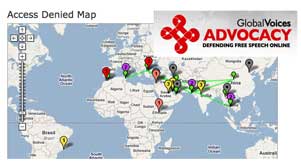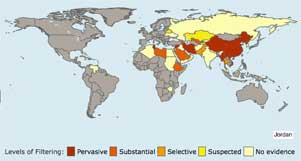 ·GlobalVoices ADVOCACY has a page they call the Access Denied Map. On it they track visually, including pop-up annotations, countries that prohibit access to web sites. ·GlobalVoices ADVOCACY has a page they call the Access Denied Map. On it they track visually, including pop-up annotations, countries that prohibit access to web sites.
The thing that made the biggest impression on me is the number of countries that block bloggers or Flickr. (You can check this yourself by going to their site and clicking the pushpins on their Google map.) |
 ·Opennet.net also tracks blocking/filtering worldwide. They look at the reasons given for filtering and compile maps tracking four different types of filtering. ·Opennet.net also tracks blocking/filtering worldwide. They look at the reasons given for filtering and compile maps tracking four different types of filtering.
|
Silence is…
Silence is… well, it’s just amazing that a modern industrialized, developing and supposedly participatory country could jail hundreds (or thousands) of dissidents in order to keep them from speaking in public. And in contravention of principles of religious freedom (which, incidentally, is not guaranteed in China).
Tibetan monasteries empty as China jails monks to silence Olympic protests in TimesOnline UK
“Chinese authorities tightened security around Tibet’s main monasteries and banned visits to a sacred site on the edge of the capital, Lhasa, for fear of a fresh outburst of unrest on the Dalai Lama’s birthday.
“Few monks remain, however, in the province’s three most important monasteries. Many have disappeared, their whereabouts a mystery. Chinese officials have deployed troops and paramilitary police around the ancient religious institutions, suspecting these sprawling hillside communities are at the heart of the unrest that has swept the region since early March.”
Seems to me that the theory must be that silencing protest during the Olympic Games is intended to remove it from the world’s stage (Shakespeare “All the world’s a stage…”) at a time when China is receiving increased attention – but it certainly will backfire because it is happening at a time when China is center-stage, and even after the restraints are removed, it will keep China center-stage in the human rights spotlight for a longer time.
This report has naught to do with electronic media, networks or technology. It’s just unfortunate to see how governments deal with the things that embarrass those in power by muzzling the mouths (and sometimes the bodies) of those who disagree with the powerful.
Videoblogging in real time
 I don’t know how I ran across this thing that Robert Scoble is now doing – but here he is interviewing people at Davos using a cellphone camera (actually two at the same time) – and questions coming in in real-time. I’ll just point you at his interview of danah boyd on QIK.COM (more about her later because she’s important to what I do in real life). Check danah at her blog “Apophenia :: making connections where none existed before.”
I don’t know how I ran across this thing that Robert Scoble is now doing – but here he is interviewing people at Davos using a cellphone camera (actually two at the same time) – and questions coming in in real-time. I’ll just point you at his interview of danah boyd on QIK.COM (more about her later because she’s important to what I do in real life). Check danah at her blog “Apophenia :: making connections where none existed before.”
China’s Golden Shield (The Great Firewall of China) – How long can it stand?
![]() Here’s another, very recent, report on how well China’s Golden Shield (otherwise known as the Great Firewall of China) is or isn’t working. By Oliver August, in WIRED. I was encouraged to read here (and other places as well) news that blogging continues to increase in China and although there’s plenty of repression of bloggers, there are just more and more of them every day.
Here’s another, very recent, report on how well China’s Golden Shield (otherwise known as the Great Firewall of China) is or isn’t working. By Oliver August, in WIRED. I was encouraged to read here (and other places as well) news that blogging continues to increase in China and although there’s plenty of repression of bloggers, there are just more and more of them every day.
For example, one tale from this article… “As Chinese citizens become aware that their most potent advantage over censorship is their sheer numbers, more and more grievances are aired online — sometimes with significant consequences. The first cyber-rebellion to have a major political impact took place in 2003. Sun Zhigang, a young migrant worker in Guangzhou, died in police detention after failing to produce identity documents during a street check. Sun’s friends protested his death on discussion boards, and soon other sites picked up a campaign demanding police accountability and reform of the laws affecting migrant workers. Before the unprepared system monitors could react, an avalanche was in motion. …”
“Of course, China is hardly a Jeffersonian paradise. Thousands languish in prison because of harmless online activities. A recent example is Zhang Jianhong — blogging as Li Hong — who was sentenced to six years for posting political essays. Cases like his justify strong criticism of China. But they don’t prove that its monitoring system is successful on a national scale. …”